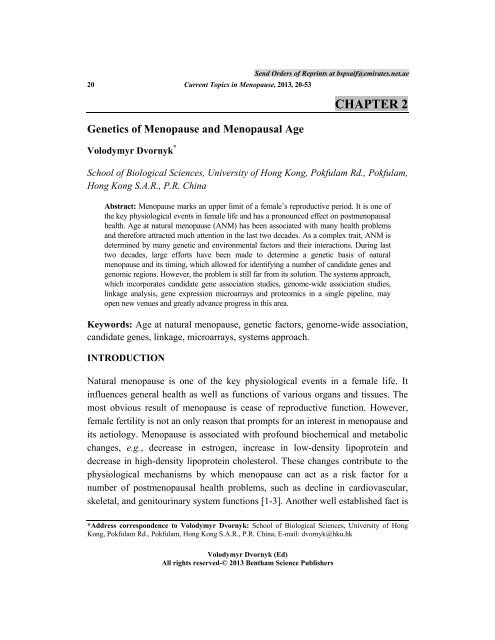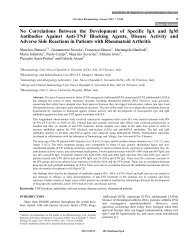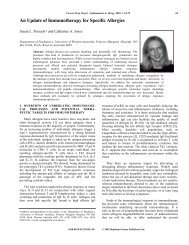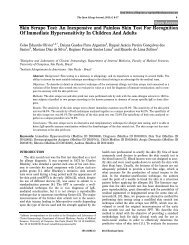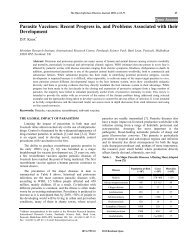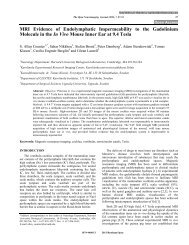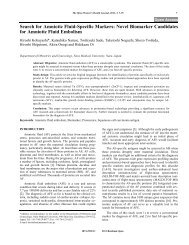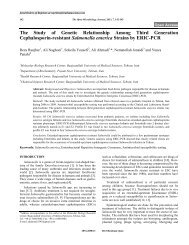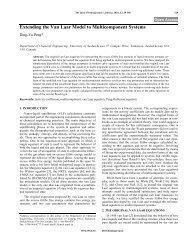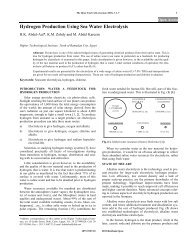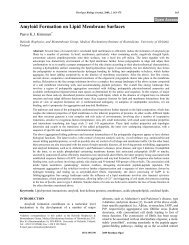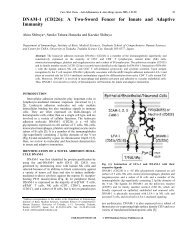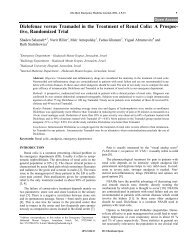Download - Bentham Science
Download - Bentham Science
Download - Bentham Science
You also want an ePaper? Increase the reach of your titles
YUMPU automatically turns print PDFs into web optimized ePapers that Google loves.
20 Current Topics in Menopause, 2013, 20-53<br />
Genetics of Menopause and Menopausal Age<br />
Volodymyr Dvornyk *<br />
CHAPTER 2<br />
School of Biological <strong>Science</strong>s, University of Hong Kong, Pokfulam Rd., Pokfulam,<br />
Hong Kong S.A.R., P.R. China<br />
Abstract: Menopause marks an upper limit of a female’s reproductive period. It is one of<br />
the key physiological events in female life and has a pronounced effect on postmenopausal<br />
health. Age at natural menopause (ANM) has been associated with many health problems<br />
and therefore attracted much attention in the last two decades. As a complex trait, ANM is<br />
determined by many genetic and environmental factors and their interactions. During last<br />
two decades, large efforts have been made to determine a genetic basis of natural<br />
menopause and its timing, which allowed for identifying a number of candidate genes and<br />
genomic regions. However, the problem is still far from its solution. The systems approach,<br />
which incorporates candidate gene association studies, genome-wide association studies,<br />
linkage analysis, gene expression microarrays and proteomics in a single pipeline, may<br />
open new venues and greatly advance progress in this area.<br />
Keywords: Age at natural menopause, genetic factors, genome-wide association,<br />
candidate genes, linkage, microarrays, systems approach.<br />
INTRODUCTION<br />
Send Orders of Reprints at bspsaif@emirates.net.ae<br />
Natural menopause is one of the key physiological events in a female life. It<br />
influences general health as well as functions of various organs and tissues. The<br />
most obvious result of menopause is cease of reproductive function. However,<br />
female fertility is not an only reason that prompts for an interest in menopause and<br />
its aetiology. Menopause is associated with profound biochemical and metabolic<br />
changes, e.g., decrease in estrogen, increase in low-density lipoprotein and<br />
decrease in high-density lipoprotein cholesterol. These changes contribute to the<br />
physiological mechanisms by which menopause can act as a risk factor for a<br />
number of postmenopausal health problems, such as decline in cardiovascular,<br />
skeletal, and genitourinary system functions [1-3]. Another well established fact is<br />
*Address correspondence to Volodymyr Dvornyk: School of Biological <strong>Science</strong>s, University of Hong<br />
Kong, Pokfulam Rd., Pokfulam, Hong Kong S.A.R., P.R. China; E-mail: dvornyk@hku.hk<br />
Volodymyr Dvornyk (Ed)<br />
All rights reserved-© 2013 <strong>Bentham</strong> <strong>Science</strong> Publishers


